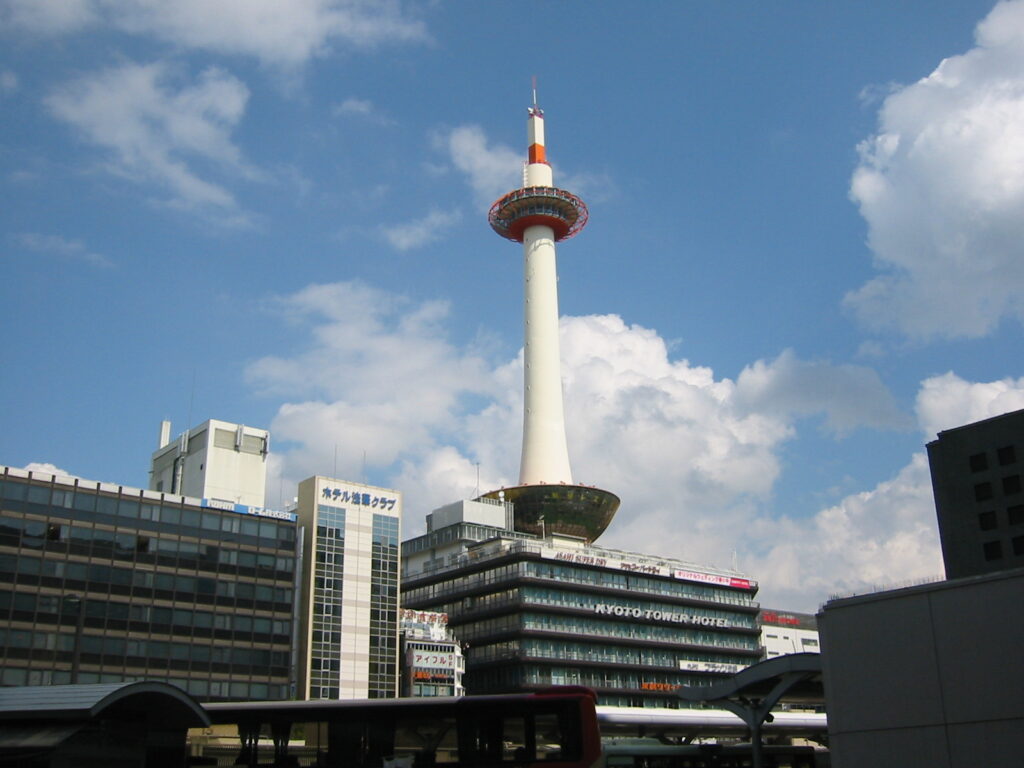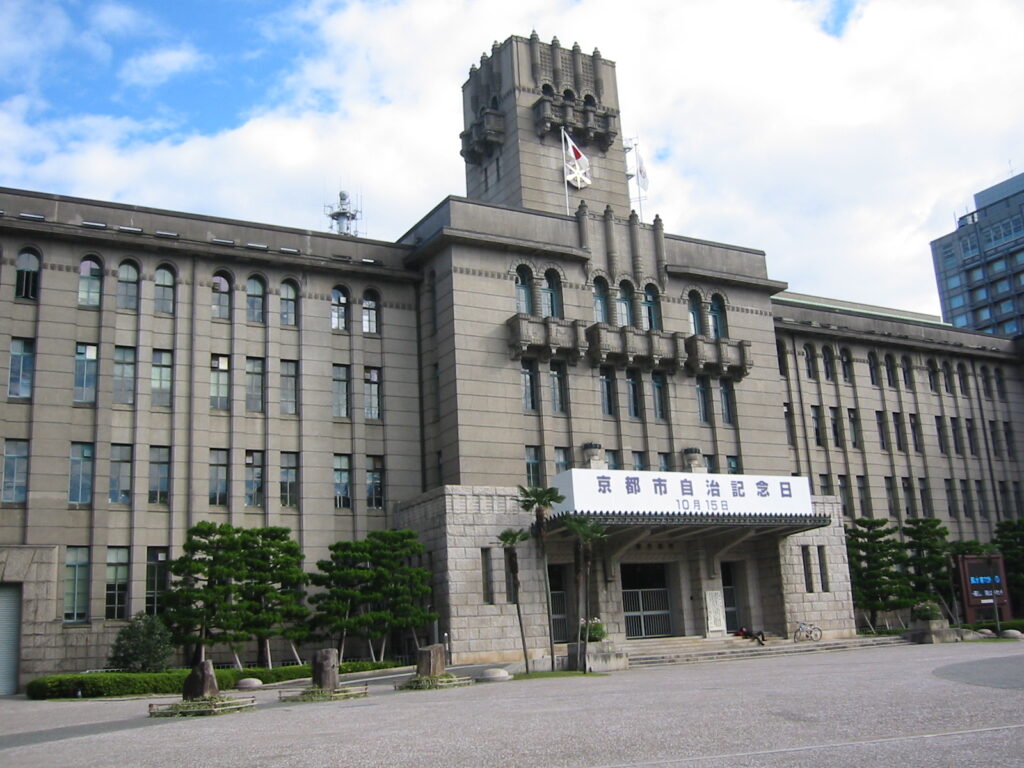和文英訳に役立つ英語表現集 (9)

地上131メートルの京都タワー
1. The subject does not come within the scope of the present article.
(このテーマは、現在の論文の範囲内にはない)
2. In view of my poor health I have decided to withdraw my application.
(健康がすぐれないので、私は申請を取り下げることに決めた)
3. The news of her marriage came as a surprise to us all.
(彼女の結婚の知らせは、私たち全員に驚きであった)
4. This invention is finding wide application today in various industries.
(この発明は、今日の色々な産業に広く応用されるだろう)
5. You must learn to behave responsibly with other people’s money.
(他人のお金については、責任をもって行動することを、学ばなければならない)
6. Increasingly, the computer is behaving as a replacement for books.
(ますます、コンピューターは本の代わりをしている)
7. We all agree on the importance of reading skills, but there remain crucial differences as to how they should be taught.
(読書技術の重要性については、私たち全員が同じ考えであるが、どのようにして教えるかについては、決定的な違いが残っている)
8. I love nature. I want to live in the wilderness and play with wild animals. Someday I hope to live in a place where I will be able to live in harmony with nature.
(私は自然が好きだ。荒れ地に住んで、野性の動物と遊びたい。いつか、自然と調和して生活できるところで、私は暮らしたい)
9. Children normally repeat the behavior that they observe in their parents.
(子供たちは、通常、彼らが見ている両親の行動を繰り返す)
10. A large part of England came under the control of Anglo-Norman Magnates.
(イングランドの大部分は、アングロ・ノルマン王たちの支配下に入った)
11. I couldn’t grasp the problem until she showed me what was wrong.
(何が間違っているか、彼女が教えてくれるまで、私はその問題が把握できなかった)
12. No good ever comes of pretending that a problem doesn’t exist.
(問題が存在しないふりをしても、良いことはない)
13. There are people who carry their cares to bed every night of their lives.
(心配を毎晩ベッドまで持ち越す人がいる)
14. If everybody is quite agreeable, we will now move onto the next point.
(全ての人が乗り気であれば、さっさと次の点に進もう)
15. These children need loving care more than money.
(子供たちは、金より優しい愛が必要である)
16. I’ve learned to leave tomorrow’s care until tomorrow.
(今日の心配を明日まで放っておくことを、私は学んだ)
17. You’ll have to work with more care if you want to succeed.
(成功したければ、もっと注意して働く必要があるだろう)
18. On that point they disagreed sharply with each other.
(その点について、彼らはお互いにするどく意見を対立させた)
19. Out of that discussion came a number of useful suggestions.
(その議論から、多くの有益な提案が出てきた)
20. The appearance of mobile computers has entailed great changes for the workers.
(携帯型のコンピューターの出現は、労働者にとって、大きな変化を伴った) entail 「必然的に伴う」
21. When school was over, all the boys in the class emptied out into the playground.
(授業が終わると、クラスのすべての少年たちは、教室を空にして運動場にいった)
22. When it comes to toilet training it is best to be patient.
(トイレのしつけになると、忍耐強いことが一番良い)
23. The automobile industry in China is undergoing substantial structural changes.
(中国の自動車産業は、かなりの構造変化を経験している)
24. Could you mind changing places with me?
(場所を私と変わってもらえませんか?)
25. It is rare for her to display an active dislike for another person.
(彼女が、他の人に激しい嫌悪を示すのは珍しい)
26. It’s amazing how much things have changed since I was young.
(若い頃から、事物がどれくらい変わっているか、驚くほどだ)
27. He has an intimate acquaintance with several languages of the Indian subcontinent.
(インド亜大陸のいくつかの言語に、彼は精通している)
28. The ability to concentrate is an acquirement very hard to come by.
(集中力は、得るには難しい技能である) come by 「偶然に得る」
29. It is wrong to apply one’s own standards of goodness to other cultures.
(他の文化に、自分自身の善の基準をあてはめるのは、間違っている)
30. Tears came into my eyes when I saw my daughter try on her wedding dress.
(娘がウェディングドレスを着ようとしているのを見て、私の目に涙が出てきた)
31. He came very near being run over by a car.
(彼は車に轢かれそうになった)
32. Tom behaved admirably in spite of the difficult circumstances.
(困難な状況にもかかわらず、トムは見事に行動した)
33. My wife and I separated by mutual agreement and in a friendly spirit.
(お互いの同意と友好的な精神で、妻と私は離婚した)
34. You’ll just have to come to terms with the fact that she is more capable than you.
(彼女があなたより有能であるという事実に、あなたは受け入れなければならないだろう)
35. There are different patterns of behavior in the male and in the female.
(男性と女性には、異なった行動パターンがある)
36. If war were to come upon us in these circumstances, we would suffer appalling losses.
(このような状況で、戦争がやって来るなら、私たちは恐ろしい損失を被るだろう)
37. The University of Tokyo invites applications for an associate professorship in American Studies.
(東京大学は、アメリカ研究の准教授の公募をしている)
38. A spell of bad weather has driven up the price of vegetables.
(悪い天候が続いたので、野菜の値段がはねあがった)
39. Do you mind if I put our conversation on tape?
(私たちの会話を、テープにとってもよろしいでしょうか?)
40. She determined to put him out of her mind.
(彼のことを、彼女は心から追い払おうと決意した)
41. I put it to you that nuclear power is a curse on all mankind.
(あなたに言いますが、原子力はすべての人類には呪いです)
42. Knowledge and timber should be well seasoned before being put to use.
(智恵と木材は、使用する前によく乾燥させなければならない) season 「木材などを乾燥させる」
43. We can’t stand by and see her treated this way.
(彼女がこのような扱いを受けていることを、私たちは傍観できない)
44. This car has stood up to a lot of hard use.
(多くの荒っぽい使用に、この車は耐えてきた) stand up to 「酷使や攻撃などに耐える」
45. He was held up to students as a model of hard work.
(猛勉強の模範として、彼は学生たちに押し立てられた)
46. The constitution stands in need of amendment.
(憲法は修正が必要である) stand in need of ~ 「~を必要としている」
47. He stands high in English and history, but rather low in algebra.
(彼は、英語と歴史は点数がよいが、代数はかなり低い)
48. Domestic manufacturers failed to put up a strong stand against import.
(国内産業は、輸入に対して強い抵抗をやり通すことに失敗した) put up 「抵抗力などを示す、やり通す」 stand 「断固とした抵抗」
49. We take up our stand on the eternal principle of right and justice.
(権利と正義という永遠の原則に、私たちの立場を定める) take up one’s stand 「立場を取る」
50. You may not take me as such, but I was educated in England.
(そのように考えないかもしれませんが、私は英国で教育を受けました)

京都市役所本庁舎 昭和二年に完成 令和三年に改修工事終了
51. The child held on to his mother’s apron to keep from falling to the ground.
(地面に落ちないように、子供は母親のエプロンにしがみついた) hold on to ~ 「~にしがみつく、~を手放さない」
52. My father was thrown out of employment when his company went bankrupt.
(会社が破産したとき、父は免職となった)
53. The shock took ten years off his life.
(そのショックで、彼は十年寿命が縮んだ)
54. Anything you say may be taken down and used in evidence against you.
(あなたが話すことは何でも書き取られ、あなたに不利な証拠として使用されるかもしれません)
55. She stared at him, not seeming at once to take in what he meant.
(彼の言いたいことがすぐに理解していないようだったが、彼女は彼を睨んだ)
56. The situation is beginning to take on a sinister appearance.
(その状況は、不気味な様相を取り始める) take on 「外観、性質などを身に付ける」
57. Taken all in all, the city is one of the best governed in the world.
(全体的に考えれば、その市は世界でもっともうまく統治された市の一つである)
58. Don’t take it badly if I discuss your mistakes in my paper.
(論文であなたの失敗を論じても、悪く取らないで欲しい)
59. She was so beautiful she took the audience’s breath away.
(彼女は非常に美人だったので、聴衆は思わず息をのんだ)
60. The word is customarily used of women rather than men.
(その言葉は、男性より女性について、通常は使用される)
61. In boarding schools, a century and a half ago, the rod was used unsparingly.
(一世紀半前の全寮制学校では、鞭は容赦なく使われていた)
62. Policemen’s clubs were used on the crowd.
(警官の棍棒が、群集に使われた)
63. At times, the government finds it politically useful to publicly defends the rights of the minorities.
(時折、少数民族の権利を公に擁護することが、政治的に有用であると政府は見出す)
64. Considering the downtown traffic, a bicycle is useful as the quickest means of transportation.
(都心の交通を考えれば、もっとも迅速な移動手段として、自転車は役に立つ)
65. Don’t forget about the potential usefulness of the connections you make while you are at university.
(大学にいたときに作ったコネは、将来十分に役立つことを忘れてはいけない)
66. They felt that Japanese companies were colluding to keep non-Japanese businesses out.
(日本の会社が、外国人の企業を参入させないように共謀したと、彼らは感じていた) collude 「ひそかに結託する」
67. The new system doesn’t seem to be of any use to the citizen.
(その新しいシステムは、市民の役に立つようには思えない)
68. The correct use of prepositions takes time to master.
(前置詞の正しい使用は、修得するのに時間がかかる)
69. People rarely make good use of wealth they have not earned.
(人々は、不労所得を有効に使うことは、滅多にない)
70. This dictionary is very outdated and is of little use for this kind of translation.
(この辞書はかなり時代遅れなので、この種の翻訳には、ほとんど役に立たない)
71. The holder of the card is entitled to unlimited free use of the streetcars of the city.
(そのカードの持ち主は、町の電車に無制限に無料で乗る権利がある)
72. She has been working on the problem these four years.
(この四年間、彼女はこの問題を研究してきた)
73. She walked about to work the stiffness out of her legs.
(足のこわばりをほぐすため、彼女は歩き回った)
74. Salary increases are not keeping up with increases in the cost of living.
(昇給は、生活費の上昇に追いつけない)
75. The methods that work with one person will not necessarily work with another.
(ある人に有効な方法が、他の人にも有効とはかぎらない)
76. I read the newspapers every day to keep abreast of current events.
(現代の出来事に付いていくために、毎日、私は新聞を読む)
77. In my earlier years I myself held to his view.
(小さい頃は、私自身、彼の見解にしがみついていた)
78. He sees it as his moral duty to give up some of his time to good work.
(立派な仕事に時間を割くことは、道徳的義務だと彼は思っている)
79. She did some wonderful work on the mechanisms involved in the genetic transmission of the disease.
(その病気の遺伝子伝達に関するメカニズムについて、彼女は素晴らしい仕事をした)
80. Within certain parameters, employees are permitted to set their own working hours.
(ある範囲内で、従業員は自分の就労時間を、設定することが許されている) parameters 「限界、範囲」
81. The indigenous Ainu largely were assimilated into the general population centuries ago; a few small, scattered groups, however, have maintained their identity in Hokkaido. (Encyclopaedia Britannica Online)
(土着のアイヌは数世紀前に一般大衆にほとんど同化された。しかしながら、数少ない散在するアイヌの集団は、北海道で独自性を維持している) assimilate 「同化する、吸収する」
82. The Japanese language is generally included in the Altaic linguistic group and is especially akin to Korean, although the vocabularies differ. (Encyclopaedia Britannica Online)
(日本語は通例アルタイ語族に含まれ、語彙は違っているが、韓国語に特に類似している) akin to 「類似の、血族の」
83. After the Meiji Restoration (1868), Shintō was restructured as a state-supported religion, but this institution was abolished after World War II. (Encyclopaedia Britannica Online)
(1868年の明治維新の後は、神道は国家的支援をうける宗教として再構成されたが、この制度は第二次世界大戦後には廃止された)
84. Christianity was introduced into Japan by first Jesuit and then Franciscan missionaries in the mid-to late 16th century. (Encyclopaedia Britannica Online)
(キリスト教は最初イエズス会修道士によって、のちにはフランシスコ修道士によって、16世紀の半ばから後期に日本に伝えられた)
85. Japan experienced spectacular population growth after 1868; the population increased nearly fourfold since then. (Encyclopaedia Britannica Online)
(日本は1868年以降驚くほどの人口増加を経験した。人口はすぐにその時から四倍近くに増えた)
86. Japan is remarkable for its extraordinarily rapid rate of economic growth in the 20th century, especially in the first several decades after World War II. (Encyclopaedia Britannica Online)
(日本は20世紀における異常に早い割合の経済成長では目立っている。特に、第二次世界大戦後の最初の数十年間においてそうである)
87. The number of workers engaged in fishing has declined sharply, and, as with agriculture, the fishery worker population has aged rapidly. (Encyclopaedia Britannica Online)
(漁業に携わる労働者の数は、急激に減った。そして農業と同じように、漁業の労働人口は急速に高齢化した)
88. The Bank of Japan, established in 1882, is the sole bank that issues the yen; it also plays an important role in determining and enforcing the government’s economic and financial policies. (Encyclopaedia Britannica Online)
(1882年に設立された日本銀行は、日本円を発行する唯一の銀行である。それはまた政府の経済や金融政策を決定し実施する重要な役割も果たしている)
89. Because of Japan’s meagre natural resources, the bulk of its imports are fuels, raw materials, and foodstuffs. (Encyclopaedia Britannica Online)
(日本の乏しい天然資源のために、輸入の大部分は燃料、原材料、食料品である) meager 「貧弱な、やせこけた」
90. Many families now have two or more automobiles and are more likely to drive to a destination than in the past, resulting in road congestion in the big cities and in industrial areas. (Encyclopaedia Britannica Online)
(今や多くの家庭では二台以上の車を所有して、以前よりは目的地には車で行くことが多い。その結果、大きな都市や産業地帯では道路の渋滞がおきる) congestion 「密集、混雑」
91. In 1927 the first subway was built in Tokyo’s downtown district, and over time it was expanded into one of the most extensive systems in the world. (Encyclopaedia Britannica Online)
(1927年に最初の地下鉄が東京の都心にできた。時が経つにつれて、地下鉄は世界で最も広範囲にわたるシステムの一つに拡張された) expand 「広げる、拡大する」
92. Japan’s constitution was promulgated in 1946 and came into force in 1947, superseding the Meiji Constitution of 1889. (Encyclopaedia Britannica Online)
(日本国憲法は1946年に公布された。そして1947年に施行され、1889年の明治憲法に取って代わった) promulgate 「公布する、公表する」、supersede 「取って代わる」
93. Executive power is vested in the cabinet, which is organized and headed by the prime minister, though formally appointed by the House of Representatives. (Encyclopaedia Britannica Online)
(行政権は内閣に与えられ、公式には衆議院で任命される首相によって組織され率いられる) vest 「付与する、授ける」
94. The population of Tokyo, the most populous prefecture, is some 20 times greater than that of Tottori, the least populous. (Encyclopaedia Britannica Online)
(最も人口の多い東京都の人口は、最も人口の少ない鳥取県のおよそ 20 倍である)
95. The Supreme Court consists of a chief justice and 14 other justices. The chief justice is appointed by the emperor upon designation by the cabinet, while the other justices are appointed by the cabinet. (Encyclopaedia Britannica Online)
(最高裁判所は一人の裁判長と 14 人の他の裁判官からなる。裁判長は内閣の選定を受けて天皇陛下から任命され、他の裁判官は内閣によって任命される) designation 「指定、選任」
96. As mentioned above, Japan’s 1947 constitution stipulates that the country cannot maintain armed forces for purposes of aggression. (Encyclopaedia Britannica Online)
(以前に述べたように、1947 年の日本国憲法は国が侵略のための軍隊を保有できないと規定してる) stipulate 「規定する、明記する」
97. Japan’s crime rate is low compared with that of most countries, especially for violent crimes—in part because of the severe restrictions placed on the possession of firearms. (Encyclopaedia Britannica Online)
(日本の犯罪率はほとんどの国と比較して低い。特に暴力犯罪がそうである。それは一部には銃器の所有に関して厳しい制限があるためである)
98. The health insurance system, established in 1961, covers all citizens. The scale of payments into it varies, and in some cases no payments are required. (Encyclopaedia Britannica Online)
(1961 年に設立された健康保険制度は、すべての国民を含む。その支払いの程度は色々あり、ある場合には支払いはまったく必要ではない)
99. The social and economic benefits of education long have been recognized in Japan, and education has been seen as the all-important means to achieve personal advancement. (Encyclopaedia Britannica Online)
(教育の社会的・経済的な利益は、長い間、日本では認識されていた。そして教育は個人の出世を達成するための最も重要な手段であると考えられていた) all-important 「肝要な」
100. The two great former imperial universities—Tokyo and Kyōto—represent the pinnacle of academic success, and competition to enter one of them is particularly intense. (Encyclopaedia Britannica Online)
(東京大学と京都大学の二つの偉大な旧帝国大学は、学問的成功の最高峰を表し、どちらかに入学することは特に難しい) pinnacle 「頂点、頂上」


